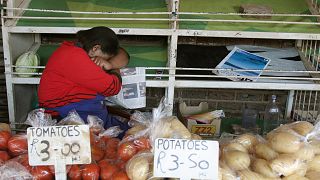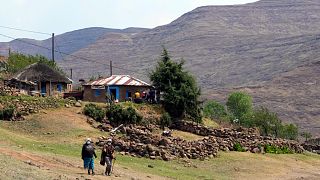Egypt
In Luxor, a jewel in the archeological tourism of southern Egypt, Abu Aya spent most of his idle time sitting in front of his souvenir shop in the souk of the city.
Despite a resumption of tourist bookings resulting in a slight quiver in attendance, he has not yet found a smile. “This improvement is not yet beneficial to traders and families in the region,” he says.
With the owners of the neighboring shops, this 47-year-old salesman dressed in an ample galabeya gray (traditional dress of Upper Egypt) recalls these beautiful days when foreign visitors flocked by thousands.
“Before, my galabeya was full of dollars and euros,” he recalls.
Collapse
Like him, nearly 4 million Egyptians worked directly or indirectly in this sector before the 2011 revolt, according to the Ministry of Tourism.
Twenty years ago, an extremist group killed 58 foreign tourists in Luxor in front of Hatshepsut temple, but visitors returned there afterwards.
This is not the case since the popular uprising of January 2011, which caused the fall of the dictator Hosni Mubarak: the ancient temples are deserted and Egypt remains plunged in the economic crisis.
Tourism, one of the main resources of the country, is the cost of a chronic instability.
Since the fall of Islamist President Mohamed Morsi in the summer of 2013, security forces are confronting extremist groups targeting the police, the army and the Coptic Christian community.
In October 2015, 217 passengers and seven crew members of a Russian MetroJet flight from Sharm el-Sheikh (Sinai) were killed in an action claimed by the Islamic State (EI) group.
Several European countries then dissuaded their nationals from visiting certain parts of Egypt.
Result: the collapse of the sector is spectacular. In 2010, Egypt had a record of 15 million visitors. They were only 5.3 million in 2016, according to the Ministry of Tourism, nearly three times less.
Maher Abdel Hakim, hotel expert and coordinator of the tourism committee in Luxor and Aswan, another mythical city in southern Egypt, confirms that traders in Upper Egypt have been greatly affected.
“Previously, tourists walked around the monuments, wandering around in carriages, buying souvenirs, gold jewelery and various craft items. Everyone was a winner,” he recalls.
In the courtyard of the temple of Luxor, built more than 3,400 years ago, only a small number of Egyptian tourists walk between the gigantic columns engraved with Pharaonic inscriptions.
Persevering, the drivers of carriages follow them and negotiate the price of the ride. “I will accept any price you offer, I just want to feed my horse,” one of them said to potential customers.
New tourists
Tourism revenues amounted to almost $ 12 billion in 2010. Evaluated by the Central Bank of Egypt at just $ 1.3 billion for the first three months of 2017, these revenues increased by 128% compared to the same period of 2016.
Enthusiastic, hotel expert Mr. Abdel Hakim expects hotel occupancy of 30% at the end of the year against 23% in 2016 and 17% in 2015, with attendance increasing traditionally in winter.
He attributes this improvement to the arrival of new tourists, Chinese or Indians. “We also note an increase in tourism from the Gulf, which was previously limited to Cairo, Sharm el-Sheikh and Hurghada”, on the shores of the Red Sea, he said.
Above the temples of Karnak, Hatshepsut or Ramesseum, balloons of all colors always carry tourists. But, for one year, the passengers are indeed mostly Chinese.
Despite a new attempt at an attack in 2015, Luxor is sure, Abu Aya said. Ann Zhu, a Chinese tourist, agrees. “I feel safer in Luxor than in Cairo, and the people here are great,” said the 28-year-old.
Ahmed Hassan, a hot-air balloon pilot, assures himself that he has gone to Mandarin. “But relying on Chinese tourists would be like putting all of his eggs in one basket,” he admits.
AFP













02:20
Descendants of enslaved Africans find connection in Ghana
01:51
China expands visa-free travel to 74 countries, Africa left out
02:19
Morocco sees surge in Chinese tourists
01:05
Ethiopia's mega-dam on the Nile is "now complete", Prime Minister says
02:09
In a bid to aid its economy, Lebanon hopes to return to golden age of tourism
01:09
Egypt: Inflation forecast to have climbed further in May